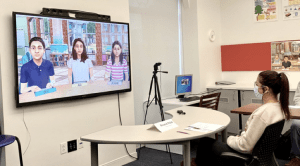
SMU students practiced essential communication skills with Mursion, an immersive simulation assisted by Artificial Intelligence.

SMU students practiced essential communication skills with Mursion, an immersive simulation assisted by Artificial Intelligence.

Over the summer of 2021, three SMU undergraduate students and one high school student tested components of a research study training surgeons in Zambia to treat postpartum hemorrhage. Three of the students tested a virtual reality surgical simulation developed for the study.

Undergraduate students in a public health course at SMU propose diverse approaches and perspectives while discussing public health measures taken during the COVID-19 pandemic and its relation to limiting civil liberties.
Dr. Eric G. Bing’s innovative Creating Impact in Global and Public Health course prepares students to analyze and develop solutions for complex public health challenges.

Innovative research on meditation and mindfulness continues at SMU
Lead by Dr. Eric G. Bing, professor of global health in the Department of Applied Physiology & Wellness in the Annette Caldwell Simmons School of Education & Human Development and in the Department of Anthropology in Dedman College of Humanities and Sciences, a team of researchers from the Institute for Leadership Impact is conducting innovative research on meditation and mindfulness.
In light of the era-defining COVID-19 pandemic, SMU epidemiologist Dr. Eric G. Bing has created a new undergraduate course focused solely on international diseases and how we can combat them. Pandemics! The Science of Disease Spread, Prevention, and Control (APSM/ANTH/MNO 4344), which kicks off in Spring 2021, will give SMU students the basic tools they need to understand the many factors that drive disease spread and how local and global communities can combat it.
 The Center for Global Health Impact and the Institute for Leadership Impact, both headquartered at Southern Methodist University in Dallas, Texas, have released a joint impact report for the 2019-2020 academic year.
The Center for Global Health Impact and the Institute for Leadership Impact, both headquartered at Southern Methodist University in Dallas, Texas, have released a joint impact report for the 2019-2020 academic year.